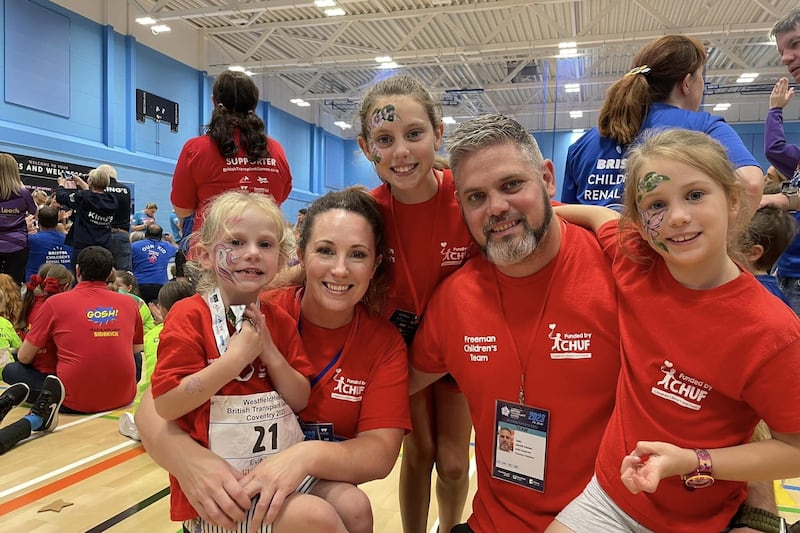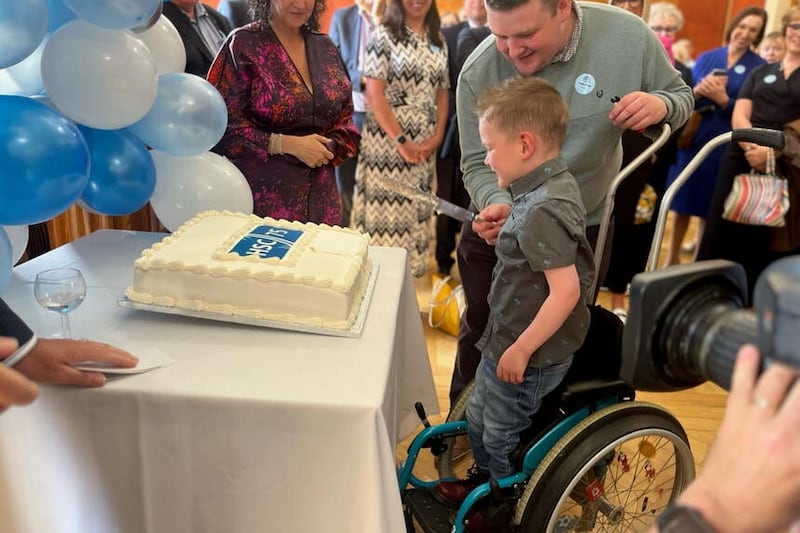WHEN Mairead Kelly regained consciousness after her liver transplant, one of the first things she noticed was that the interminable itching which had plagued her had stopped.
She was also hit by the realisation that her wedding, which had been put on hold until an organ donor was found, could go ahead and that she had been given back her future.
The Cookstown woman, now aged 34, received her liver four years ago last week.
The anniversary not only coincided with Organ Donation Awareness Week but also the second reading of the Organ and Tissue Donation Bill in the Assembly.
If the legislation is passed, people will automatically become donors unless they specifically opt out, bringing Northern Ireland into line with the rest of the UK.
There are currently around 115 people here on the waiting list for an organ and each year around 10-15 people die while awaiting a transplant.
Figures also show that while 90 per cent of people in Northern Ireland support organ donation, only half have signed the Organ Donor Register.
And because only one per cent of people die in circumstances where donation is possible, every signature on the register is vital.
All Mairead knows about her donor is that she was a 57-year-old woman.
"That lady and her family are my heroes," she says. "I am so grateful they had that conversation and that she signed the organ donation register. Without that, I wouldn't be here."
Mairead's problems with her liver began in her 20s when she was diagnosed with primary sclerosing cholangitis (PSC) and cirrhosis, caused by the ulcerative colitis she had suffered from since childhood and the medication she took for it.
"The PSC causes the bile duct to narrow and scar and impedes the flow of bile into your liver, so the bile goes into your bloodstream instead," she explains.
The result was itching from which she could find no relief and which led her to scratch so much that she developed cuts which became infected.
She was also troubled by lack of sleep, poor appetite, hair loss and shooting pains down the right-hand side of her body.
However, Mairead's initial reaction was just to keep going.
"At that stage I was working in the Glenavon House Hotel in Cookstown and loved it. I never stopped, because I knew if I did I wouldn't be able to start again," she says.
"I had patches of hair that had fallen out and, as a young girl, it was very upsetting.
"The whole thing was mentally and physically draining."
However, matters came to a head in 2016 as her condition worsened, with Mairead confiding in her doctor at the Royal Victoria Hospital (RVH) that she didn't know how much longer she could cope.
Then, in March, she was asked to attend King's College Hospital in London where she was assessed and told she had reached the point where she needed a transplant.
"That was such a relief, to know there was light at the end of the tunnel," she says.

Mairead and boyfriend Damian got engaged shortly afterwards but didn't want to set a wedding date due to the uncertainty surrounding an organ donor.
"We had been going out for about a year at that point and I said to Damian, 'You can walk away now, I won't hold it against you' and he was like, 'Would you wise up'."
In August 2017, there was bitter disappointment when Mairead travelled to King's after being told of a possible liver, only to learn, following tests, that the organ was not viable for transplant.
But a month later, the call that was to change her life came through, with news that a possible match had been found.
"I was flown with mummy by air ambulance to King's, had the tests and by 11am they were saying I was going to theatre," recalls Mairead.
"I was in surgery for five-and-a-half hours, in King's for 10 days and then back to the Royal in Belfast and I did so well, they let me home on the third day."
Since then, Mairead says she has "never looked back" despite going through a rejection seven months ago which led to her being admitted to the liver unit at the RVH.
Although she was given high doses of intravenous steroids over two weeks, the treatment failed to work and Mairead was transferred to King's for a further 10 days of different medication which, thankfully, was successful.
"Damian came to London with me and he was allowed to come in and see me for an hour every day which was lovely," says Mairead.
"I also had mummy and daddy's support from home via video call and I couldn't have coped without seeing them.
"The doctor told me that if the medicine didn't work I would be there until I got a new liver.
"I don't know the reason for the rejection. It's just one of those things. Organ donation is fabulous but your body will always try to fight that organ.
"I take tablets every day but that's a small price to pay to still be here.
"It's only within the last couple of weeks that my blood levels have been properly coming out of rejection."

Mairead says she will be eternally grateful for the support of her family, including mum and dad Siobhan and Tony McHugh, friends, the "fantastic" RVH Liver Support Group and the team of doctors, nurses and transplant coordinators over the years.
She counts herself as "very, very lucky".
"When you go through something like this, you find out who is there for you and who's not," she reflects.
"My family means everything to me. I am happy with very little. I spend time with my mum and dad every day. My nieces and nephews, my granny, my husband, my family and friends - as long as I know they're alright, I'm alright.
"Even when I was going through my rejection, the amount of people who came out to support me - lighting candles, saying prayers, being in touch just to let you know they were thinking of you. People are so kind."
Mairead says the RVH Liver Support Group, in particular, has been a massive help to her and the family.
It was founded in January 1998 by Kay Duffy from Moy in Co Tyrone after her husband Frankie underwent a successful liver transplant in 1995.
Now a registered charity, it complements the support already provided by staff at the RVH, providing a listening ear as well as raising money to help buy hospital equipment and provide grants for people who have to travel outside Northern Ireland for treatment.

Says Mairead: "I think everybody should be an organ donor and families should talk about their wishes. One person has the potential to save the lives of up to nine people.
"You could end so much pain and suffering for somebody just by that one selfless act."
The Organ Donor Register can be found at organdonationni.info.







